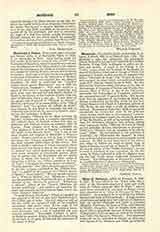

Menendez y Pelayo, MARCELINO, poet, historian and literary critic, b. at Santander, Spain, in 1856; d. at Santander in 1912. After having made his first studies in his native town, he went in 1871 to the University of Barcelona, where he passed two years and won the admiration of his fellow-students, his teachers and of the Government, by which he was given extensive means for making literary, critical, and historical researches. At the age of twenty-two he was appointed to the chair of literature in the University of Madrid, and three years later was received into the Spanish Academy. In 1876 he published his “Estudios criticos sobre poetas Montaneses” and in 1880 his “Heterodoxos Espanoles”. This work, which is a proof of the writer’s incomparable knowledge and skill, deals with the political and literary history of Spain in its relation to the Catholic Church from the time of Priscilian down to our age. A new phase of his genius was displayed in “Horacio en Espana”. Himself a lyric poet of no mean ability, as his “Oda a Horacio” and “La galerna del sabado de gloria” bear witness, he was fitted to undertake the task of collecting and criticizing the numerous Spanish translations and imitations of Horace.
His extensive “Historia de las ideas esteticas en Espana” includes not only a complete exposition of the aesthetic ideas of Spanish writers but also an elaborate and finished treatise on aesthetic ideas in Europe. Four volumes have been published on “Los origines de la novela en Espana”, a treatise on the origin of the Spanish novel. This is one of the most learned and original of Menendez y Pelayo’s works. From a national as well as from a Catholic viewpoint the “Ciencia espanola” (1887) is one of the most valuable publications of this writer. The work is chiefly a collection of letters and essays which demonstrate that Spain is one of the richest nations in original and sound philosophy and is endowed with many scientists of remarkable genius. Here also he proves that the Inquisition did not hinder culture in Spain, but fostered it. Other works of Menendez y Pelayo are: “Obras completas de Lope de Vega”, “Antologia de poetas liricos castellanos”, “Critica literaria” and “Poetas hispano-americanos”. In the five volumes contained in the “Critica literaria” are published his essays on the “Mystic poetry of Spain“, “Saint Isidore”, “History considered as an Art”, “Tirso de Molina”, etc. Menendez y Pelayo was the president of the Academia Real de la Historia, director of the “Revista de archivos”, “Bibliotecas y museos”, editor of the “Nueva biblioteca de autores castellanos”, and member of countless literary and scientific societies both in Spain and in the other European countries.
In point of style Menendez y Pelayo is regarded as the superior of all writers who have flourished since the Golden Age of Spain. His first essays as well as his last works are composed with all his youthful enthusiasm and poetic taste. Every page of his writings reveals a wealth of strong common sense, clear perception, and a vein of wonderful and ever varying erudition. Thoroughly Catholic in spirit, the found his greatest delight he declared, in devoting all his work to the glory of God and the exaltation of the name of Jesus.
WILLIAM FURLONG

